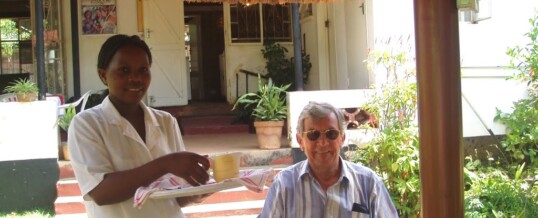
I loved this by Daniel Craig (no, not that one) in HotelInteractive
“In 2007, a traveler wrote the following review of Opus Hotel Vancouver on TripAdvisor: “The GM who thought he was Ian Fleming was a real detriment to a great trip. Shame — let’s hope the hotel sees sense and releases Daniel to make another movie.” Ouch. The comment was a reference to my James Bond namesake and my secondary career as a mystery novelist, but nonetheless I was baffled by it, having no recollection of any guest encounter that would have provoked a public cry for my dismissal.
Since the review was anonymous, we had no way of contacting the guest to find out what went wrong. Because it was a personal attack that offered little useful information, we asked TripAdvisor to remove it. But they refused, and it remains there today. Sometimes we hoteliers have to set aside our professionalism and say, “Whatever”. (When it comes to reviews) a few reviewer types have emerged whose advice should be taken with a healthy dose of skepticism. In the spirit of parody, here are a few to watch out for.
The Self-Appointed Expert. This reviewer has posted scores of reviews, yet quite possibly has never left his computer room. An aspiring travel memoirist, he writes lengthy, flowery missives colored with acid-tongued remarks like, “To call this a fleabag hotel would be an insult to fleas and bags everywhere.” Although he positions himself as a martyr to the travel community, he wouldn’t object if a hotel offered him a free stay in exchange for a glowing review.
The Patron Saint of Hotels. This reviewer is so over-the-top in her praise either she’s never had a vacation before or she’s been into the sacred wine. She rates all services as excellent, including those the hotel doesn’t offer, and uses exalted phrases like “A hidden gem!”, “Glorious!” and “I thought I’d died and gone to heaven!” Because she insists on seeing the good in everyone, she often finds herself making excuses on behalf of a hotel, such as, “My niece fell down the elevator shaft, but I’m sure they’ve gotten that fixed.”
The Up-trader. Having scoured the internet for deals until he scored a five-star hotel at a two-star rate, this bargain-hunter now expects all other services to be equally discounted. He expresses moral outrage over charges for breakfast, telephone and the mini-bar, accusing the hotel of gouging. His comments are revealing: “$28 for parking!?! That’s how much I usually pay for a room! Rip OFF!”
The Down-trader. This high-flying business traveler used to spend lavishly on luxury hotels until the economic crisis forced a drastic reduction in her expense account. Now obliged to stay in budget properties, she lives in denial, complaining bitterly about the lack of a day spa, fur boutique and gourmet restaurant at her roadside motel.
The Uncle Bob. Like that dull relative who subjects you to endless vacation photos and anecdotes, this reviewer goes on and on but never manages to say anything helpful or interesting. “My room had a bed and a desk and a chair. Oh, and a painting of a landscape. Molly at the front desk—or was it Maggie? Well, whoever it was, gosh darn was she swell when we needed directions to the local IHOP…” Next.
The Extortionist. After a series of mishaps, all of which were his own fault, this traveler tried every trick in the book to weasel a comp stay from the hotel, and now resorts to posting a blistering online review. He rates everything as terrible, including things that were perfectly fine. His reviews read like ransom notes, with bad spelling and grammar, excess punctuation, and random capital letters: “This hOtel SUKCED!! RobeRto the Duty manger?%? was LaiMe…!!!!!”
The Shill. This reviewer writes in a style that sounds suspiciously like the hotel’s promo material, with phrases only marketing people use, like “nestled in the heart of vibrant old-town” and “well-appointed furnishings with dreamy Celestial Comfort™ beds”. Her review contrasts sharply with the other, not-so-generous reviews and is typically a one-off. Although she signs off with a cutesy pseudonym like “TravlinGrrrl”, she’s undoubtedly the hotel’s director of marketing.
The Forensic Examiner. This CSI enthusiast treats hotel rooms like a crime scene, posting reviews with gory photographic evidence of carpet stains, bathroom mold and bedbug bites. Even when his review is glowing, his photos make the room look cheap and squalid, particularly when personal items and family members are in the background.
The Corporate Saboteur. This reviewer is a hotel owner writing a nasty, bogus review of a competitor hotel in hopes of boosting his own property’s ratings. Telltale signs include anonymity and remarks like, “I finally checked outta that dump and went to the ABC HOTEL. Twenty bucks cheaper and free donuts! I’ll never stay anywhere else!”
There’s no question, online reviews are a great resource, providing insight, humor and tried-and-true tips from the field. Yet travelers shouldn’t forget to consult the experts in print and online guidebooks, newspapers and magazines. If I find a lump on my throat, I’m heading to a doctor for treatment, not to some online quack who claims to be able to show me how to remove the lump from home.
We can all help increase the reliability of reviews by posting our own after our trips. Just remember to stick to the facts, play fair, and go easy on the punctuation. And try not to get too personal. It might not always seem evident, but hotel managers have feelings too.”
Great stuff Daniel!
7
NOV




















